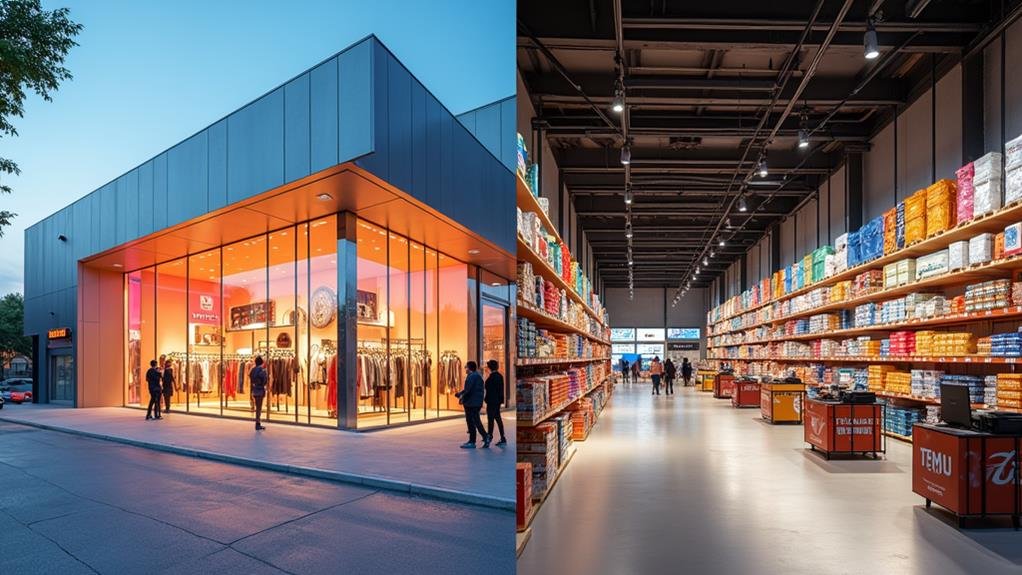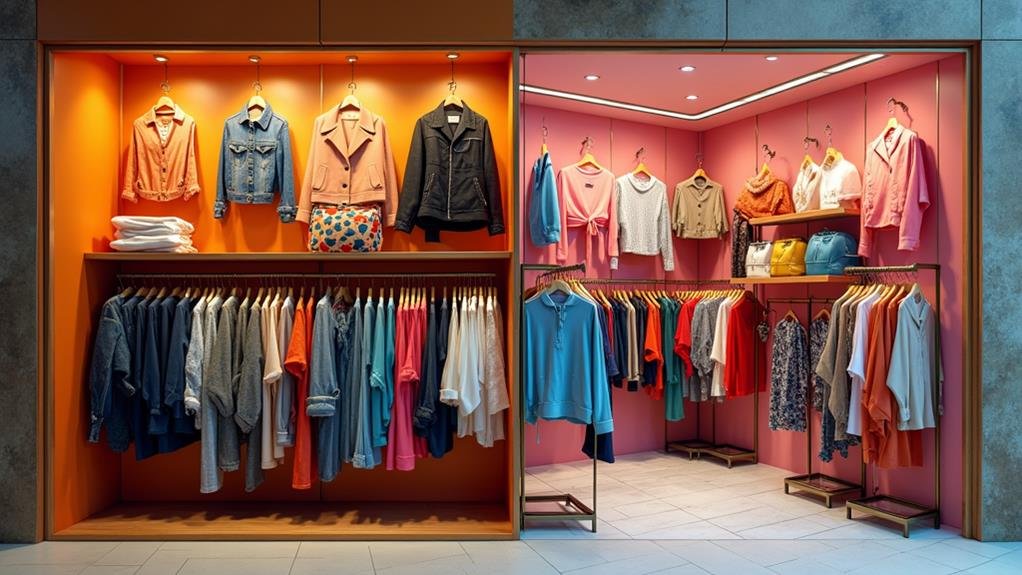
Shein and Temu are fundamentally different online platforms. Shein, founded in 2008, specializes in fast fashion, primarily targeting Gen Z consumers with a focus on women's apparel and accessories. In contrast, Temu, established in 2022, operates as a broader online marketplace with over 250 categories, emphasizing low prices through independent sellers. While both face ethical criticisms regarding labor practices and sustainability, Shein tends to have a better reputation for product quality and quicker shipping. Conversely, Temu's model poses significant quality control challenges. Further exploration reveals the nuances in their operations and consumer experiences.
Company Background

What distinguishes Temu from Shein in the evolving landscape of online retail? Founded in September 2022, Temu operates as a burgeoning online marketplace and sister company to Pinduoduo, emphasizing a vast selection across over 250 categories.
Temu's business model raises questions about its ethical implications, particularly regarding sustainability and labor practices, which are critical factors for modern consumers.
In contrast, Shein, established in 2008, has carved its niche in fast fashion, primarily targeting Gen Z consumers with trendy apparel.
While both platforms source products from Chinese manufacturers, Temu focuses on low-cost items and fosters a diverse array of independent sellers, while Shein blends third-party offerings with its proprietary inventory.
Additionally, Temu promotes a safe shopping environment, whereas Shein has faced criticism for its labor practices, raising concerns among consumers regarding product quality and ethical sourcing.
For those considering ethical purchasing, Temu's ethical concerns should be carefully weighed.
Business Models Comparison
The contrasting business models of Temu and Shein illustrate the diverse strategies employed within the online retail sector.
Temu operates as a B2C online marketplace connecting consumers with independent sellers, emphasizing low-cost products across various categories. This model is supported by a robust local warehousing system that enhances operational efficiency and reduces shipping times, greatly improving customer satisfaction local warehousing benefits.
In contrast, Shein adopts a hybrid model, blending third-party sellers with its curated inventory, primarily focused on fast fashion.
Key differences include:
- Revenue Generation: Temu earns through seller fees and commissions, while Shein derives most of its revenue from direct sales and partnerships, achieving $22.7 billion in 2022.
- Target Audience: Temu appeals to bargain hunters, whereas Shein attracts fashion-conscious consumers.
- Pricing Strategies: Temu eliminates middlemen for lower prices, while Shein minimizes unsold inventory through on-demand production.
Product Offerings and Quality

The product offerings of Temu and Shein highlight a stark contrast in focus and quality.
While Temu boasts a diverse range of over 250 categories, its reliance on third-party sellers leads to significant quality control challenges, resulting in mixed customer experiences. This is particularly important when considering the necessity for marketers to stay informed about global trends and adapt their strategies accordingly.
Conversely, Shein's concentration on women's fashion allows for more stringent inventory management and generally better quality, raising important questions regarding the balance between price and quality in the fast-fashion market.
Diverse Product Range
Maneuvering the diverse product ranges of Shein and Temu reveals considerable differences in their offerings and quality perceptions.
While Shein primarily specializes in women's fashion and accessories, Temu provides a broader marketplace that offers over 250 categories, appealing to a wide audience.
This analysis highlights key distinctions:
- Product Specialization: Shein focuses on trendy clothing, while Temu includes electronics and home goods.
- Pricing Strategy: Shein often features products under $10, contrasting with Temu's generally higher price point.
- Quality Assurance: Shein has garnered better overall reviews for quality products, while Temu faces mixed feedback, often linked to seller pricing pressures.
These factors considerably influence consumer choices while shopping online, particularly among small businesses seeking diverse product options.
Quality Control Challenges
Maneuvering the complexities of product offerings and quality reveals significant challenges in quality control for both Shein and Temu.
Temu's quality control is particularly inconsistent, often resulting in customer dissatisfaction stemming from lower-quality items, particularly due to cost-cutting measures by third-party sellers. This inconsistency is exacerbated by their strategy of sourcing directly from manufacturers, which can lead to variations in product quality and heightened safety concerns, as seen in their shipping origins and logistics.
In contrast, Shein generally offers better product quality, although it still encounters issues with sizing inaccuracies and craftsmanship.
Both platforms face scrutiny over defective products, with customers frequently voicing concerns about specific items, especially from Temu. Additionally, the reliance on overseas manufacturing complicates their quality assurance processes, leading to varying product quality and heightened safety concerns.
These challenges ultimately impact customer service and shipping time, further complicating the consumer experience.
Price Vs. Quality Debate
Consumers' perceptions of value are often shaped by the intricate balance between price and quality, particularly in the context of Shein and Temu. The price vs. quality debate reveals distinct trends:
- Product Offerings: Temu boasts over 250 categories, including electronics and home goods, while Shein focuses on affordable fashion, with many items priced under $10.
- Product Quality: Shein generally enjoys a better reputation for product quality, although both platforms experience quality control challenges.
- Shipping and Reliability: Shein is noted for more reliable product descriptions and sizing, an essential factor for consumers.
Pricing Strategies
Pricing strategies play an essential role in distinguishing Shein and Temu within the competitive landscape of online retail.
Temu vs Shein reveals a stark contrast; Temu is recognized for its exceptionally low prices and extensive discount offers, often achieved by bypassing middlemen and directly connecting with manufacturers. This direct supply chain model, along with cost reduction strategies, allows Temu to maintain its competitive edge.
While Shein offers affordable clothing, typically under $20, its prices generally exceed those of Temu across numerous categories. Both platforms leverage the de minimis exemption to maintain low prices, but Temu further enhances its pricing appeal through sign-up bonuses and app incentives.
In contrast, Shein employs limited-time offers and bulk discounts. Ultimately, Temu's pricing model positions it as the more economical choice, greatly impacting consumers' shopping experience and perceptions of quality.
Customer Experience

The customer experience for Shein and Temu reveals significant differences in delivery speed and return process efficiency.
While Shein is often commended for its rapid order fulfillment, with items typically arriving within 6-7 days, Temu has encountered challenges related to order accuracy and fulfillment timelines.
Moreover, customers seeking flexibility in their work hours can benefit from opportunities to earn money from home quickly, such as those available on JobOpp.com (job opportunities).
Additionally, Temu's more straightforward return policy, which includes a free first return and a generous 90-day window, contrasts with Shein's variable return process that may complicate customer refunds.
Delivery Speed Comparison
When comparing the delivery speeds of Shein and Temu, notable distinctions emerge that can greatly influence customer experience. Both platforms utilize standard shipping from China, yet Temu generally outpaces Shein in delivery speed.
Key factors include:
- Shipping Duration: Temu's standard shipping typically takes 7 to 15 days, while Shein averages 7 to 21 days. Leveraging data-driven decisions can help consumers choose platforms based on delivery performance.
- Free Shipping Options: Temu offers free standard shipping on most products, whereas Shein's free shipping often leads to longer wait times.
- Customer Reviews: While Shein enjoys a more consistent delivery experience, with many orders arriving within 6-7 days, Temu has reported shipping delays affecting order fulfillment.
These contrasts in delivery speed can considerably shape customer satisfaction with each platform.
Return Process Efficiency
A thorough examination of the return processes for both Shein and Temu reveals notable disparities that can greatly affect customer experience.
Temu allows returns within 90 days, offering the first return free; however, subsequent returns incur a $7.99 fee, and refund processing can take 5-14 business days. To enhance customer satisfaction, companies can also consider implementing streamlined return processes, similar to the approach seen in affiliate marketing strategies that prioritize user experience.
In contrast, Shein's return policies vary by item, often necessitating customers to verify return eligibility at checkout, yet it generally receives positive feedback for its efficient return process.
The ease of returns and expedited refund processing considerably impact customer satisfaction, with Temu struggling to maintain trust due to complications in order fulfillment.
Security and Ethical Concerns
Raising alarm bells in the fast fashion industry, both Shein and Temu are grappling with significant security and ethical concerns that merit close examination.
These issues not only affect consumer trust but also pose broader implications for the industry. As the demand for transparency in production practices increases, legal and financial considerations become essential for brands to address these concerns effectively.
- Labor Practices: Reports indicate Shein's factories operate under sweatshop conditions, while Temu faces allegations of forced and child labor.
- Security Concerns: Shein has experienced data breaches, and Temu's app was pulled from the Google Play Store due to malware.
- Toxicity Claims: Shein's products have been criticized for toxic materials, impacting resale markets, while Temu's food containers raise safety concerns.
These factors contribute to negative consumer behavior and heightened environmental concerns, challenging the sustainability of fast fashion.
Frequently Asked Questions
What Is the Difference Between Shein and Temu?
Shein and Temu differ greatly in business models, focusing on fast fashion versus a broader marketplace. While Shein prioritizes product quality and size inclusivity, Temu emphasizes competitive pricing and faster shipping options amid rising ethical concerns.
Are Temu and Shein Owned by the Same Company?
The ownership structure of Temu and Shein differs considerably. Temu operates under Pinduoduo, leveraging distinct market strategies and advertising tactics, while Shein maintains independent brand management, targeting specific customer demographics and employing a unique supply chain model.
What Brand Is the Same as Shein?
Shein alternatives include various discount retailers and sustainable brands that offer fast fashion and trendy apparel. These platforms emphasize fashion affordability while catering to online shopping trends, appealing to consumers seeking similar styles without compromising values.
Why Are Shein and Temu so Cheap?
Shein and Temu's affordability stems from bulk purchasing, low manufacturing costs, and efficient supplier relationships. Their aggressive marketing strategies and alignment with fast fashion consumer trends further enhance their appeal in the competitive online shopping landscape.